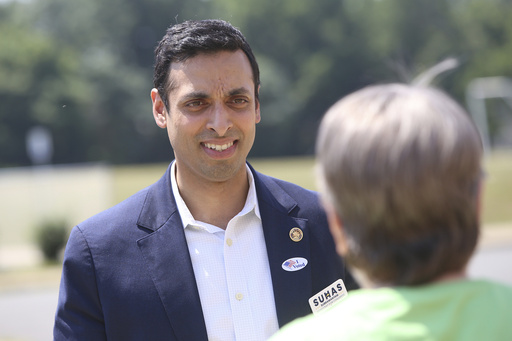
Fredericksburg, Va. — The state of Virginia is facing critical contests in its U.S. House races during Tuesday’s election, particularly in two key districts. One of these is being vacated by Democratic U.S. Representative Abigail Spanberger, who has chosen to run for governor next year. The other district has a history of fluctuating between Democratic and Republican candidates.
In Virginia’s 7th House District, a fierce competition is underway between Republican Derrick Anderson and Democrat Eugene Vindman, both of whom are vying to succeed Spanberger. This spot has become a battleground, especially as Republicans look to capitalize on opportunities in areas without an entrenched incumbent. Vindman, a political newcomer, gained national attention after acting as a whistleblower during the first impeachment of Donald Trump, alongside his brother. His campaign primarily focuses on abortion rights and concerns over far-right extremism affecting democracy. Conversely, Anderson, who is also a veteran and a former Green Beret, has branded himself as a more approachable candidate, emphasizing economic issues in his campaign.
Historical trends indicate that Republicans had a strong grip on this district for almost five decades before Spanberger broke that streak by defeating former Republican representative David Brat in 2018.
Meanwhile, U.S. Representative Jen Kiggans is working to solidify her position in the 2nd Congressional District, where she faces Democratic challenger Missy Cotter Smasal. Kiggans previously unseated Democratic incumbent Elaine Luria in 2022, and Democrats are rallying behind Smasal in hopes of reclaiming the seat. The 2nd District has notably swung between political parties over the years, often favoring candidates with military backgrounds.
The differing platforms of the candidates reflect the national divisions between the two major political parties. Kiggans has concentrated her reelection campaign on economic growth and border security, while Smasal emphasizes issues like abortion access and safeguarding democracy in the wake of the January 6 insurrection. Given the district’s large population of military veterans, both candidates stress the importance of veteran support and addressing rising living costs.
In Northern Virginia, the political landscape is shifting as Democrats work to maintain their representation following the announcement from Democratic Representative Jennifer Wexton that she will not seek reelection due to a diagnosis of progressive supranuclear palsy. The district, which has skewed more liberal in recent years, sees Democrat Suhas Subramanyam running against Republican Mike Clancy.
Subramanyam, who previously served as a tech advisor under the Obama administration, began his political journey when he was elected as a state lawmaker in 2020, later joining the Virginia Senate last November. His campaign against Clancy, who has a background as a corporate attorney and military service in the Navy’s General Counsel Office, gained momentum after Subramanyam secured the Democratic nomination in a competitive primary in June.
As federal elections approach, the outcomes in these Virginia districts could play a pivotal role in shaping the control of the U.S. House. The outcome of these closely watched races will be indicative of the broader national sentiment influencing voters across the country.

